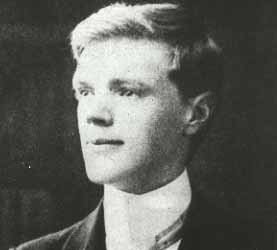David Herbert Lawrence Berühmte Zitate
„Kunst ist die Technik der Gefühlsmanipulierung im Verhältnis zur Wirklichkeit.“
in: Ch. Caudwell, Studien zu einer sterbenden Kultur
Lady Chatterley, Kapitel 1
Original engl.: "Ours is essentially a tragic age, so we refuse to take it tragically. The cataclysm has happened, we are among the ruins, we start to build up new little habitats, to have new little hopes. It is rather hard work: there is now no smooth road into the future: but we go round, or scramble over the obstacles. We've got to live, no matter how many skies have fallen." - Lady Chatterley's Lover.
David Herbert Lawrence: Zitate auf Englisch
“They stood together in a false intimacy, a nervous contact. And he was in love with her.”
Quelle: Women in Love
“Sleep is still most perfect, in spite of hygienists, when it is shared with a beloved.”
Quelle: Sons and Lovers
Letter to Blanche Jennings (9 October 1908), Letters of D.H. Lawrence (1979), James T. Boulton, ed., as quoted in The Intellectuals and the Masses: Pride and Prejudice Among the Literary Intelligentsia, 1880-1939 (1992) by John Carey; also quoted in "Art for the Masses : The Death of Culture & the Culture of Death" http://www.touchstonemag.com/docs/issues/14.7docs/14-7pg22.html by Ralph McInery in Touchstone magazine (September 2001)
“Ours is essentially a tragic age, so we refuse to take it tragically.”
Lady Chatterley's Lover (1928)
“God is only a great imaginative experience.”
Phoenix: The Posthumous Papers of D. H. Lawrence, pt. 4, ed. by E. McDonald, (1936)
“Every man has a mob self and an individual self, in varying proportions.”
Pornography and Obscenity (1929)
“I suppose that's what we do in death⎯⎯⎯sleep in wonder.”
Quelle: Sons and Lovers (1913), Ch.11
Psychoanalysis and the Unconscious (1921)
“It's the man who dares to take, who is independent, not he who gives.”
Letter to John Middleton Murry, 27 November 1913 http://books.google.com/books?id=NyudR_ePn8sC&q=%22It%27s+the+man+who+dares+to+take+who+is+independent+not+he+who+gives%22&pg=PA112#v=onepage
“I hold that the parentheses are by far the most important parts of a non-business letter.”
Letter to Blanche Jennings (15 April 1908), Letters of D.H. Lawrence (1979), edited by James T. Boulton
Letter (September 24, 1923); published in The Letters of D.H. Lawrence, James T. Boulton, E. Mansfield, and W. Roberts (1987), vol. 4.
